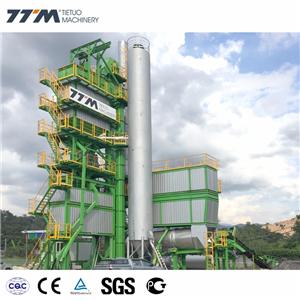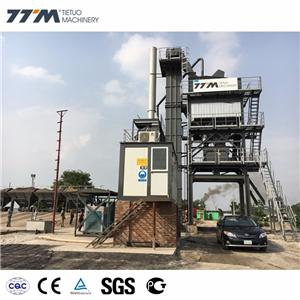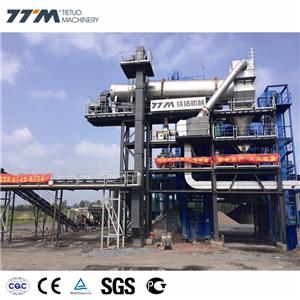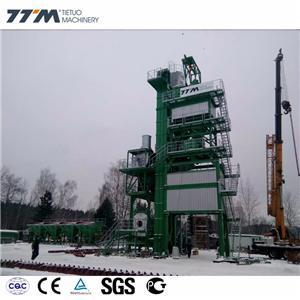Sales Discount recycled asphalt road plant machinery Brands Factory
recycled asphalt road plant machinery
recycled asphalt road machine Brands
A professor in the Department of Civil Engineering at the University of Texas at Arlington is working with the Texas Department of Transportation to test the durability of roads made of recycled asphalt using an accelerated pavement tester made by himself.
Stefan Romanowski (Stefan Romanoschi) won a two-year, $1.26 million TxDOT award to determine which recycled asphalt mixture has a longer life and works better on Texas roads.UTA is working on the project with the Texas Aries M Institute of Transportation.
"We will also determine the performance of mixtures containing recycled asphalt pavement under truck driving, temperature and humidity conditions," Romanowski said. "
He pointed out that RAP is a material obtained from grinding damaged asphalt pavement and is widely used in the production of new asphalt mixtures. The reutilization rate is about 90% in the United States, 60% in Europe and close to 100% in Japan.
Romanoschi received research funding for his first TxDOT project in 2012. To prepare for the project, he built an accelerated road tester, which will be located at the university's new road testing center in Fort worth, opposite the UTA Institute. The entire pavement cushion of the accelerated pavement Test Center is about half an acre.
The machine uses a verified cold regeneration process to recover surface and base materials as part of the recycling train and pass through the entire width of the road at one time. The machine is used for the granulation of road materials and converts them into a new, uniform material mixture by adding adhesives, such as cement, asphalt emulsion, or foamed asphalt. It can remove all or layers of asphalt surface to adapt to road conditions. The mixing capacity of the cold regenerator can reach 800 tons / hour, and the recycled material can be transported to the asphalt paver through the rear rotating adjustable height unloading conveyor, or the recycled material can be left on the ground for pneumatic movement.
Sales recycled asphalt road machinery
Wirtgen's tracking recycler uses a downcutting process for recycling, milling and stirring the rotor to rotate synchronously. The company claims that this approach allows users to selectively change the particle size of the material being processed.
In addition to the W380 CR, its stage V / IV final compliant diesel provides 775kW, and there are also secondary compliant W380 kW for use in non-regulated markets. New generation Wirtgen recyclers also include W240 Cri, which also has a 775kW diesel to meet stage V and US level 4 final requirements, as well as W240 CR retrofit to an unregulated market with 708kW, Class 2 compliant diesel.
The W240 CRi and W240 CR recyclers can also be equipped with integrated Vogele AB 375T variable presses with a maximum operating width of 2.35m.
In 2014, the paving industry used nearly 2 million tons of RAS to replenish mixtures and pave new roads, marking a strong and growing customer base of materials that are often sent to landfills.
However, with the decline of the price of asphalt cement, the use of RAS is spiraling.The road-laying industry has switched to cheaper raw materials, and the use of RAS on roads has more than halved by 2017.
Despite the dismal numbers, (ASR), an asphalt tile recycling system in Barrington, Rhode Island, was not affected. Since its inception in 2009, the company's main goal has been to work with the North American roof industry to improve the sustainability of its business by finding an end market for RAS. In the midst of a sudden economic downturn, the company has been vigilant in its efforts to achieve its goals.
Discount recycled asphlat plant Factory
Alan Clark (Alan Clarke), partner at ASR Systems, said: "We want to see tile recycling reach its full potential." "We've had good times and bad times, but we believe everything will be all right. But we and others need to innovate in how to do that. "
Asphalt tiles are the main source of waste in the roof industry, with nearly 90 per cent of asphalt tiles in landfills across the country, according to ASR Systems.
Dan Horton (Dan Horton) left his executive position at roof maker IKO Industries in 2009 to build the ASR system, when he aimed to minimize that proportion.
Since then, the company's three plants-two in Tennessee and one in Connecticut-have processed more than 150000 tons of RAS.There, roofers throw away their recycled tiles, and like most people who recycle them, ASR cuts them into smaller pieces than 3 / 8 inches by reducing the number of devices.
However, the asr, process takes on other forms-which is just the beginning of the company's involvement in the recycling of asphalted tiles.
Since the automobile age, contractors have been relying on traditional hot mix asphalt manufacturing methods, which is a chaotic and complex process. Not only does it cause pollution, but the mixture must be transported from the factory to the construction site, releasing more carbon dioxide into the atmosphere and increasing the cost of fuel.




